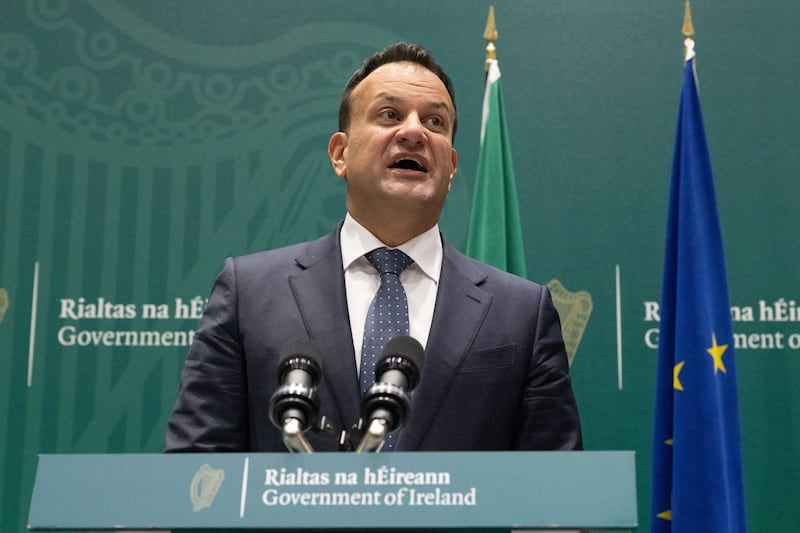Proposed amendments to the constitution to broaden the definition of a family and delete a reference to women’s duties in the home are reflective of a more modern and inclusive Ireland, the Taoiseach has said.
The Government has confirmed that two referendums will be held on March 8 – International Women’s Day.
The referenda will be on proposals to amend Article 41 of the constitution to provide for a wider concept of family, beyond one defined by marriage; and to delete Article 41.2 and its reference to the role and duties of women in the home and replace it with a new article – 42B – that recognises care provided within a family.
The Government is not pursuing a third recommended constitutional amendment, that would have proposed the insertion of a specific reference to gender equality and non-discrimination.
Mr Varadkar explained that ministers had concerns that such a reference might “unwittingly” downplay the significance of other equality provisions within the constitution.

Final wording of the referenda will be brought before cabinet for approval on Thursday.
Confirming the March 8 voting date at a press conference in Dublin on Tuesday, Mr Varadkar expressed concern that the referenda campaign may be influenced by misinformation.
“We firmly believe that passing these amendments will reinforce the fact that Ireland is a modern, inclusive nation that strives to treat and care for all of its people equally and we’ll work vigorously to achieve this,” he said.
“We wish to conduct the referendum and the referendum campaign in a respectful manner, acknowledging that many people will have legitimate differences with the Government’s position.
“However, we will push back strongly against misinformation and distraction from any source.
“It’s crucial that we listen carefully to people in groups who may oppose these proposals and give them a fair hearing.
“But we’re all aware that it’s far too easy for debate to become polarised and the only way to avoid this is to participate in informed respectful conversation with everyone concerned. And that’s what we’ll do.”
Speaking to reporters at Government Buildings, the Taoiseach acknowledged that it had taken some time to progress the referenda.
“I know there’s been some criticism for the fact that we’ve not moved more quickly, but constitutional amendments should not be taken lightly or considered in a rash way,” he said.
The three recommendations arose from the work of a citizens’ assembly on gender equality and a special joint Oireachtas committee on gender equality.
Mr Varadkar explained why the Government would be holding votes on two of the recommended changes, but not the third.
“In relation to the family, our constitution will continue to explicitly protect both the family and the institution of marriage,” he said.
“We’re proposing wording, however, that acknowledges that families may also be founded on lasting relationships other than marriage. For example, the family headed by a lone parent or a family headed by a grandparents or guardian.
“All of us know people who are committed to each other in a loving relationship over a sustained period of time who are not married. The current protection afforded to families under the constitution might be thought of as a protective shield or canopy from external or state intervention. As currently written, the protection only extends to married families.
“Through our proposals, we’re extending this constitutional shelter to other lasting relationships and putting them on an equal footing with married families. The proposal will enable the constitution to catch up with contemporary reality and ensure that it reflects positive, inclusive ambitions.”
He added: “We’re also proposing to remove the reference to the woman’s life in the home on the basis that it no longer reflects modern social norms. We’re proposing to replace it with a new constitutional article that will recognise that care provided by family members to each other is a public good and government strives to support the provision of such care.
“On the last proposal to amend article 40.1 of the constitution to refer explicitly to gender equality and non discrimination, the legal advice is that it could weaken the all-encompassing commitment to equality within the constitution at present.
“All citizens are equal before the law, regardless of gender, race, sexual orientation, social class or anything else. And we believe that by elevating any particular category, for example that of sex-based discrimination, it could unwittingly downgrade others, such as those relating to disability, race or ethnicity for example.”

